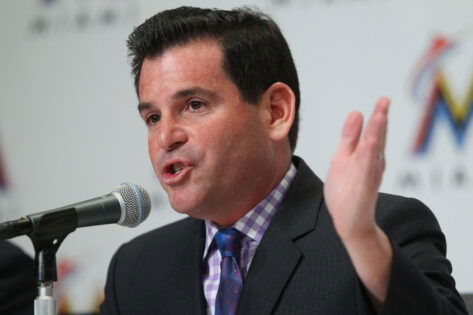“How many times do you have a talented player who just can’t stand their behaviour?” This rhetorical question from former Marlins president David Samson sums up the continuing drama involving Yankees star Jazz Chisholm Jr. pretty well. It’s the baseball “love story” with nine lives—a saga rife with Chisholm Jr.’s pointed podcast criticisms of previous organizational culture and rebuttals from Samson. Disputing his leadership, Samson labeled him “average” and even mocked his MLB The Show cover. Now, a new chapter has opened, fueled by an on-field ejection and a controversial tweet, providing Samson with new ammunition.
The most recent flashpoint came on April 17, during a Yankees-Rays game. The Bronx Bombers were ahead in the seventh inning, and Chisholm Jr. had a full count against reliever Mason Montgomery. Home plate umpire John Bacon called strike three on a pitch many felt was low. Clearly angry, Chisholm Jr. shouted and ended up being ejected for the fifth time in his career. But the real controversy erupted minutes later. From the clubhouse, while the game continued, Chisholm Jr. posted on X: “Not even f—ing close!!!!!” The tweet was quickly deleted, but not before MLB noticed, eventually handing down a one-game suspension and a fine.
New York Yankees’ Jazz Chisholm Jr., center, reacts after getting called out on strikes by home plate umpire John Bacon, left, during the seventh inning of a baseball game against the Tampa Bay Rays Thursday, April 17, 2025, in Tampa, Fla. (AP Photo/Chris O’Meara)
Chisholm Jr. appealed the suspension, later acknowledging, “I lost my emotions. I lost my cool.” Taking accountability for his outburst, he added, “I got to be better than that.” Enter Samson, who railed against Chisholm Jr.’s actions on his Nothing Personal podcast. He condemned Chisholm Jr.’s behaviour as a “total violation of Major League Baseball policy, and then tried to hide behind freedom of speech.” He derided any explanation that tried to make sense of the tweet, viewing it as a blatant rule violation, not protected speech.
Samson then broke down why Chisholm Jr.’s tweet clearly went over established lines under MLB rules. “Number one, you are not allowed to be on your phone during a game,” Samson said, noting, “It is a very strict rule because of gambling”. He then pointed out the second violation: “Number two, you’re not allowed to chastise umpires publicly.” Chisholm Jr.’s single tweet violated both a procedural rule, designed in part to protect the integrity of game officials from influences of betting. And a conduct rule, designed to protect officials from public attacks from players.
An official announcement from MLB, which confirmed the discipline, mirrored points made by Samson. Michael Hill, MLB’s senior VP for on-field operations, formally cited Chisholm Jr.’s overall “conduct, including his violation of Major League Baseball’s Social Media Policy for Major League Players”. The message was clear: multiple violations warrant serious consequences.
Balancing the scales: Yankees star, player discipline, and umpire scrutiny
Chisholm Jr. certainly isn’t the first big leaguer disciplined for airing grievances about officiating in public. Outfielder Carlos Gómez, in 2018, took to social media during a game after an ejection to rip umpire calls. And he earned himself a hefty $10,000 fine. Similarly, Ian Kinsler was fined $10,000 for saying after a game that umpire Angel Hernandez “needs to find another job”. These cases show MLB consistently penalizes public umpire criticism, though often with fines.
But tweeting during a game appears to invoke stricter penalties, directly tying Chisholm Jr.’s case to a key precedent. Chicago White Sox former manager Ozzie Guillén was suspended two games in 2011 for tweeting critical comments from the clubhouse after being ejected. It was the first such penalty for in-game social media use. Other players like Brett Lawrie faced suspensions for physical actions (throwing a helmet that hit an umpire). It shows MLB takes actions perceived to undermine authority very seriously.
Chisholm Jr.’s suspension comes amid an already contentious 2025 season for officiating. Right after his incident, another Yankee, Aaron Judge, was a victim of a controversial strike call. This ended up getting manager Aaron Boone ejected. Earlier, a crucial call at home plate was controversially overturned in a Tigers-Dodgers game. MLB is experimenting with automated systems (ABS), but they aren’t ready for prime time. Adding to the scrutiny, umpire Pat Hoberg was dismissed for violating gambling policies. Historical data shows umpires miss about 12% of ball/strike calls (nearly 29% on two-strike counts).
Now the question is: Was the penalty fair given the trigger? Or is it another example of players facing harsher public consequences than umpires, whose mistakes sometimes ignite the fire? The answer likely depends on whether you prioritize player conduct rules or officiating accuracy.
The post Infamous Yankees Star Blasted by Ex-Marlins Prez as Controversial Rule Breach Sparks Brutal Backlash appeared first on EssentiallySports.
